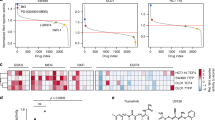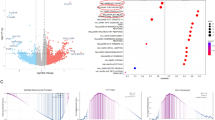Abstract
Background
TGFβ is an important cell growth regulator which may have a role in metastasis formation. Microsatellite unstable (MSI-H) colon cancer serves as a unique model to demonstrate this as most MSI-H colon cancers have a mutation in the transforming growth factor beta receptor II (TGFβRII) gene and a low metastatic rate.
Aims
To demonstrate an increase in invasion and metastasis in a MSI-H colorectal cancer cell line with a known mutation in TGFβRII.
Materials and methods
By restoring the wild-type TGFβRII gene in the KM12C MSI-H colorectal carcinoma cell line with a known mutation in TGFβRII, we have demonstrated that both invasion and metastasis in this cell line was significantly increased. A mouse metastatic model have shown that liver metastases were increased in mice inoculated with cells containing a wild-type TGFβRII gene (42% for the transfected group compared with 15% for the control group; p = 0.0379), despite a reduction in the size of primary tumours.
Conclusions
This study highlights an important mechanism which may contribute to the low metastatic rate of MSI-H colon cancers and demonstrates the importance of TGFβ signalling in metastasis formation. Previous studies involving breast cancer cell lines have shown that blocking TGFβ signalling results in a reduction in metastasis formation. This study is the first study to use a cell line with a low metastatic rate and TGFβRII mutations to demonstrate that restoring TGFβ signalling increases the metastatic rate.




Similar content being viewed by others
References
Gryfe R, Kim H, Hsieh ETK, Aronson MD, Holowaty EJ, Bull SB et al (2000) Tumor microsatellite instability and clinical outcome in young patients with colorectal cancer. N Engl J Med 342(2):69–77 (Jan 13)
Hemminki A, Mecklin JP, Jarvinen H, Aaltonen LA, Joensuu H (2000) Microsatellite instability is a favorable prognostic indicator in patients with colorectal cancer receiving chemotherapy. Gastroenterology 119(4):921–928
Aaltonen LA, Peltomaki P, Leach FS, Sistonen P, Pylkkanen L, Mecklin JP et al (1993) Clues to the pathogenesis of familial colorectal cancer. Science 260(5109):812–816
Thibodeau SN, Bren G, Schaid D (1993) Microsatellite instability in cancer of the proximal colon. Science 260(5109):816–819
Markowitz S, Wang J, Myeroff L, Parsons R, Sun L, Lutterbaugh J et al (1995) Inactivation of the type II TGF-beta receptor in colon cancer cells with microsatellite instability. Science 268(5215):1336–1338
Yamamoto H, Gil J, Schwartz S, Perucho M (2000) Frameshift mutations in Fas, Apaf-1, and Bcl-10 in gastro-intestinal cancer of the microsatellite mutator phenotype. Cell Death Differ 7(2):238–239 (Feb)
Massague J (1998) TGF-beta signal transduction. Annu Rev Biochem 67:753–791
Markowitz SD, Roberts AB (1996) Tumor suppressor activity of the TGF-beta pathway in human cancers. Cytokine Growth Factor Rev 7(1):93–102
MacKay SL, Auffenberg T, Tannahill CL, Ksontini R, Josephs MD, Nowak M et al (1998) Transfection of the type II TGF-beta receptor into colon cancer cells increases receptor expression, inhibits cell growth, and reduces the malignant phenotype. Ann Surg 227(6):781–789
Wang J, Sun L, Myeroff L, Wang X, Gentry LE, Yang J et al (1995) Demonstration that mutation of the type II transforming growth factor beta receptor inactivates its tumor suppressor activity in replication error-positive colon carcinoma cells. J Biol Chem 270(37):22044–22049
Oft M, Heider KH, Beug H (1998) TGFbeta signaling is necessary for carcinoma cell invasiveness and metastasis. Curr Biol 8(23):1243–1252
McEarchern JA, Kobie JJ, Mack V, Wu RS, Meade-Tollin L, Arteaga CL et al (2001) Invasion and metastasis of a mammary tumor involves TGF-beta signaling. Int J Cancer 91(1):76–82
Siegel PM, Shu W, Cardiff RD, Muller WJ, Massague J (2003) Transforming growth factor beta signaling impairs Neu-induced mammary tumorigenesis while promoting pulmonary metastasis. Proc Natl Acad Sci USA 100(14):8430–8435
Parsons R, Myeroff LL, Liu B, Willson JK, Markowitz SD, Kinzler KW et al (1995) Microsatellite instability and mutations of the transforming growth factor beta type II receptor gene in colorectal cancer. Cancer Res 55(23):5548–5550
Wrana JL, Attisano L, Carcamo J, Zentella A, Doody J, Laiho M et al (1992) TGF beta signals through a heteromeric protein kinase receptor complex. Cell 71(6):1003–1014 (Dec 11)
Yeatman TJ, Cher ML, Mao WG, Wloch M, Tedesco T (1996) Identification of genetic alterations associated with the process of human experimental colon cancer liver metastasis in the nude mouse. Clin Exp Metastasis 14(3):246–252 (May)
Rowland-Goldsmith MA, Maruyama H, Matsuda K, Idezawa T, Ralli M, Ralli S et al (2002) Soluble type II transforming growth factor-beta receptor attenuates expression of metastasis-associated genes and suppresses pancreatic cancer cell metastasis. Mol Cancer Ther 1(3):161–167
Hecht JR (1998) Metastasis in colorectal cancer: what makes the tumor aggressive? Eur J Surg Suppl 582:104–110
Tang B, Vu M, Booker T, Santner SJ, Miller FR, Anver MR et al (2003) TGF-beta switches from tumor suppressor to prometastatic factor in a model of breast cancer progression. J Clin Invest 112(7):1116–1124
Rowland-Goldsmith MA, Maruyama H, Kusama T, Ralli S, Korc M (2001) Soluble type II transforming growth factor-beta (TGF-beta) receptor inhibits TGF-beta signaling in COLO-357 pancreatic cancer cells in vitro and attenuates tumor formation. Clin Cancer Res 7(9):2931–2940
Akhurst RJ, Derynck R (2001) TGF-beta signaling in cancer—a double-edged sword. Trends Cell Biol 11(11):S44–S51
Cui W, Fowlis DJ, Bryson S, Duffie E, Ireland H, Balmain A et al (1996) TGFbeta1 inhibits the formation of benign skin tumors, but enhances progression to invasive spindle carcinomas in transgenic mice. Cell 86(4):531–542
Kitagawa K, Murata A, Matsuura N, Tohya K, Takaichi S, Monden M et al (1996) Epithelial-mesenchymal transformation of a newly established cell line from ovarian adenosarcoma by transforming growth factor-beta1. Int J Cancer 66(1):91–97
Oft M, Peli J, Rudaz C, Schwarz H, Beug H, Reichmann E (1996) TGF-beta1 and Ha-Ras collaborate in modulating the phenotypic plasticity and invasiveness of epithelial tumor cells. Genes Dev 10(19):2462–2477
Portella G, Cumming SA, Liddell J, Cui W, Ireland H, Akhurst RJ et al (1998) Transforming growth factor beta is essential for spindle cell conversion of mouse skin carcinoma in vivo: implications for tumor invasion. Cell Growth Differ 9(5):393–404
Ito N, Kawata S, Tamura S, Shirai Y, Kiso S, Tsushima H et al (1995) Positive correlation of plasma transforming growth factor-beta 1 levels with tumor vascularity in hepatocellular carcinoma. Cancer Lett 89(1):45–48
de Jong JS, van Diest PJ, van der Valk P, Baak JP (1998) Expression of growth factors, growth inhibiting factors, and their receptors in invasive breast cancer. I: an inventory in search of autocrine and paracrine loops. J Pathol 184(1):44–52
Tuxhorn JA, McAlhany SJ, Yang F, Dang TD, Rowley DR (2002) Inhibition of transforming growth factor-beta activity decreases angiogenesis in a human prostate cancer-reactive stroma xenograft model. Cancer Res 62(21):6021–6025
Ueki N, Nakazato M, Ohkawa T, Ikeda T, Amuro Y, Hada T et al (1992) Excessive production of transforming growth-factor beta 1 can play an important role in the development of tumorigenesis by its action for angiogenesis: validity of neutralizing antibodies to block tumor growth. Biochim Biophys Acta 2:189–196
Derynck R, Akhurst RJ, Balmain A (2001) TGF-beta signaling in tumor suppression and cancer progression. Nat Genet 29(2):117–129
Siegel PM, Massague J (2003) Cytostatic and apoptotic actions of TGF-beta in homeostasis and cancer. Nat Rev Cancer 3(11):807–821
Letterio JJ, Roberts AB (1998) Regulation of immune responses by TGF-beta. Annu Rev Immunol 16:137–161
Arteaga CL, Hurd SD, Winnier AR, Johnson MD, Fendly BM, Forbes JT (1993) Anti-Transforming Growth Factor (TGF)-beta antibodies inhibit breast cancer cell tumorigenicity and increase mouse spleen natural killer cell activity: implications for a possible role of tumor cell/host TGF-beta interactions in human breast cancer progression. J Clin Invest 92(6):2569–2576 (Dec)
Author information
Authors and Affiliations
Corresponding author
Rights and permissions
About this article
Cite this article
Warusavitarne, J., McDougall, F., de Silva, K. et al. Restoring TGFβ function in microsatellite unstable (MSI-H) colorectal cancer reduces tumourigenicity but increases metastasis formation. Int J Colorectal Dis 24, 139–144 (2009). https://doi.org/10.1007/s00384-008-0606-x
Accepted:
Published:
Issue Date:
DOI: https://doi.org/10.1007/s00384-008-0606-x




